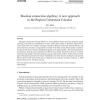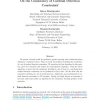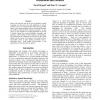117
click to vote
JUCS
2010
15 years 16 days ago
2010
Abstract: Qualitative Spatial Reasoning can be greatly improved if metric information can be represented and reasoning can be performed on it; moreover, modelling vagueness and unc...
116
click to vote
KI
2002
Springer
15 years 1 months ago
2002
Springer
In many approaches for qualitative spatial reasoning, navigation of an agent in a more or less static environment is considered (e.g. in the double-cross calculus [12]). However, i...
136
click to vote
EXPERT
2002
15 years 1 months ago
2002
Spatial reasoning is a major source of difficulties for strategy game AIs. We conjecture that qualitative spatial reasoning techniques can help overcome these difficulties. We bri...
119
click to vote
AI
2000
Springer
15 years 1 months ago
2000
Springer
The Region-Connection Calculus (RCC) is a well established formal system for qualitative spatial reasoning. It provides an axiomatization of space which takes regions as primitive...
125
click to vote
AIM
2004
15 years 2 months ago
2004
Reasoning about spatial data is a key task in many applications, including geographic information systems, meteorological and fluid flow analysis, computer-aided design, and prote...
140
click to vote
AI
2005
Springer
15 years 2 months ago
2005
Springer
We present a formal model for qualitative spatial reasoning with cardinal directions utilizing a co-ordinate system. Then, we study the problem of checking the consistency of a se...
137
click to vote
CONSTRAINTS
2006
15 years 2 months ago
2006
Topological relations are important in various tasks of spatial reasoning, scene description and object recognition. The RCC8 spatial constraint language developed by Randell, Cui...
113
Voted
AAAI
2000
15 years 3 months ago
2000
This paper demonstrates qualitative spatial reasoning techniques in a real-world diagrammatic reasoning task: Course-of-Action (COA) diagrams. COA diagrams are military planning d...
120
click to vote
FLAIRS
2007
15 years 4 months ago
2007
Much work has been done in the area of qualitative spatial reasoning over the past years, with application in various domains. However, existing models only capture particular asp...
136
click to vote
ECAI
2000
Springer
15 years 5 months ago
2000
Springer
Abstract. Representing and reasoning about orientation information is an important aspect of qualitative spatial reasoning. We present a novel approach for dealing with intrinsic o...



